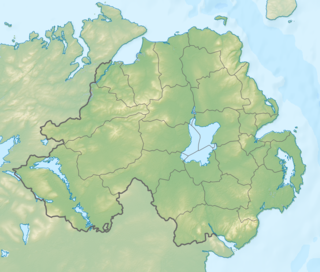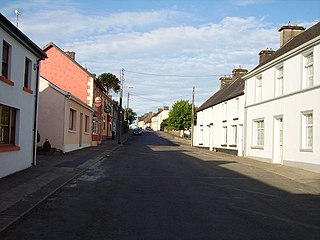
Gerard Adams is an Irish republican politician who was the Leader of the Sinn Féin political party between 13 November 1983 and 10 February 2018, and has been a Teachta Dála (TD) for Louth since the 2011 general election. From 1983 to 1992 and from 1997 to 2011, he was an abstentionist Member of Parliament (MP) of the British Parliament for the Belfast West constituency.
The Armalite and ballot box strategy was a strategy pursued by the Irish republican movement in the 1980s and early 1990s in which elections in Northern Ireland and the Republic of Ireland were contested by Sinn Féin, while the IRA continued to pursue an armed struggle against the British Army, the Royal Ulster Constabulary, and loyalist paramilitary groups. This strategy was a matter of some controversy within republicanism; some IRA members and supporters who disagreed with the strategy left to form Republican Sinn Féin in 1986.

Joe Cahill was a prominent figure in the Irish Republican movement in Northern Ireland and former chief of staff of the Provisional Irish Republican Army (IRA). He joined a junior-republican movement, Na Fianna Eireann, in 1937 and the following year, joined the Irish Republican Army. In 1969, Cahill was a key figure in the founding of the Provisional Irish Republican Army. During his time in the Provisional IRA, Cahill helped import weapons and raise financial support. He served as the chief of staff in 1972, but was arrested the following year when a ship importing weapons was intercepted. After his release, he continued to serve on the IRA Army Council and lead all financial dealings for Sinn Féin. In the 1990s, the IRA and Sinn Féin began to work on seeking peace. Cahill served on the council that called a cessation on 21 July 1996. Cahill attended several of the talks that finally led to the Good Friday Agreement on 10 April 1998. Shortly after the agreement was made, Cahill resigned as treasurer of Sinn Féin. To honour his service, he was made honorary Sinn Féin Vice-President for life.
Physical force Irish republicanism (PFIR) is the recurring appearance of a non-parliamentary violent insurrection in Ireland between 1798 and the present. It is often described as a rival to parliamentary nationalism which for most of the period drew the predominant amount of support from Irish nationalists.

The Border Campaign was a guerrilla warfare campaign carried out by the Irish Republican Army (IRA) against targets in Northern Ireland, with the aim of overthrowing British rule there and creating a united Ireland.
Raymond "Ray" Smallwoods was a Northern Ireland politician and sometime leader of the Ulster Democratic Party. A leading member of John McMichael's South Belfast Brigade of the Ulster Defence Association (UDA), Smallwoods later served as a leading adviser to the UDA's Inner Council. He was killed by the Provisional IRA outside his Lisburn home.
Sinn Féin is the name of an Irish political party founded in 1905 by Arthur Griffith. It subsequently became a focus for various forms of Irish nationalism, especially Irish republicanism. Its splits during the Irish Civil War in 1922 and again at the beginning of the Troubles in 1969 had dramatic effects on politics in Ireland. Today Sinn Féin is a republican, left-wing nationalist and secular party.
Pádraig Oliver McKearney was a Provisional Irish Republican Army paramilitary. He was killed during a British Army ambush at Loughgall, County Armagh in May 1987, aged 32.
In 1921, Ireland was partitioned. Most of the country became part of the independent Irish Free State. However, six out of the nine counties of Ulster remained part of the United Kingdom as Northern Ireland. In the 1921 elections in Northern Ireland,
Liam "Billy" McMillen was an Irish republican activist and an officer of the Official Irish Republican Army (OIRA) from Belfast, Northern Ireland. He was killed in 1975, in a feud with the Irish National Liberation Army (INLA).
Billy McKee is an Irish republican and a founding member and former leader of the Provisional Irish Republican Army (PIRA).

Tommy McKearney is a former Irish volunteer in the Provisional Irish Republican Army who took part in the 1980 hunger strike.

The Belfast Brigade of the Provisional IRA was the largest of the organisation's command areas, based in the city of Belfast. Founded in 1969, along with the formation of the Provisional IRA, it was historically organised into three battalions; the First Battalion based in the Andersonstown/Lenadoon/Twinbrook area of Southwest Belfast; the Second Battalion based in the Falls Road/Clonard/Ballymurphy district of West Belfast; and the Third Battalion organised in nationalist enclaves in the north, south and east of the city.
Dissident republicans, renegade republicans, anti-Agreement republicans or anti-ceasefire republicans are Irish republicans who do not support the current peace agreements in Northern Ireland. The agreements followed a 30-year conflict known as the Troubles, which claimed over 3,500 lives. During the conflict, republican paramilitary groups such as the Provisional Irish Republican Army waged a campaign to bring about a united Irish republic. Peace negotiations in the 1990s led to an IRA ceasefire in 1994 and to the Good Friday Agreement of 1998. Mainstream republicans, represented by Sinn Féin, supported the Agreement as a means of achieving Irish unity peacefully. 'Dissidents' saw this as an abandonment of republican ideals and acceptance of partition and British rule. They hold that the Northern Ireland Assembly and Police Service of Northern Ireland (PSNI) are illegitimate and see the PSNI as a "British paramilitary police force".

William "Plum" Smith was a Northern Irish loyalist, former paramilitary, and politician. He had been involved in Ulster loyalism in various capacities for at least forty years.
Christopher Hudson is an Irish former trade union activist who subsequently became a Unitarian minister in Northern Ireland. During the final years of the Troubles Hudson became prominent as a negotiator between the loyalist Ulster Volunteer Force (UVF) and the Irish government and played a key role helping to deliver the Northern Ireland peace process.














